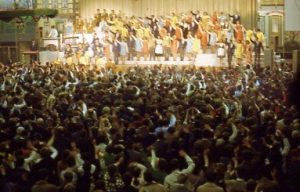WEEKDAY 20 05
Going Beyond the Law
(Ruth 1:1-22; Ps 146; Mt 22:34-4-)
*****************************
Keep it simple, sweetheart! We are probably more accustomed to a less flattering version of that saying, but I prefer this version that is much more positive.
It also applies to the teaching of Jesus when asked which was the greatest commandment. Jesus caught the Pharisees by surprise – instead of answering with a lengthy dissertation on the Law and a complicated explanation in which they were hoping to trap him, Jesus kept it simple. He didn’t focus on the negative “don’ts” of the commandments. Instead, Jesus went to the heart of the law: love!
I had an experience of this teaching when I joined the international singing group Up With People as a university student. When I arrived in Santa Fe where the group was staging for the next tour, I was told I had to keep three rules: no smoking, no drinking and no dating. I had to smile to myself as I observed some of the other youth struggling with these rules, because I didn’t need them! I didn’t smoke, had decided already that I wouldn’t drink, and because I was thinking of becoming a priest, had no intention of dating. I had already gone beyond the law out of love for God, others and myself.

Up With People closing song in Belgium 1969
Actually, in his teaching, Jesus summarized the whole bible (all the law and the prophets) in two simple sentences: “we are to love God with our whole being, and our neighbor as ourselves.” That is all God is asking of the Sadducees, Pharisees and us – it can’t be simpler than that.
The first commandment – to love God with our whole heart, soul and mind, is actually the great Shema of Judaism – what they were instructed by Moses to teach their children, wear on their arms, place on their foreheads, and inscribe on the door frame of their houses, so certainly the Pharisees were familiar with this.
What they did not know was what Jesus did next – take an obscure law from Leviticus 19:18 – love your neighbor as yourself – and place it on an equal par to the Great Schema (“and a second is like it”). Now, to love one’s neighbor as we love ourselves is just as important as loving God. In fact, perhaps the best way we can love God is not through worship as such, but by loving our neighbor as we love ourselves. That is a totally new teaching that would certainly take the Pharisees by surprise.
Jesus added some levels to these two core commandments that fleshes them out a bit more. We are to love our neighbor “as he has loved us.” That raised the bar even higher – not just to love, but to love the way Jesus loved – totally and unconditionally. On top of that, we are to love others by loving our enemies, just as Jesus loved those who were crucifying him. Jesus was forgiving them, even as he hung on the cross they had put him on. The teaching is simple and clear – we must love our enemies by forgiving them from the heart.
In Matthew 18:15, Jesus gives us a very simple way to do just that – forgive those who have hurt us. We can go to those who have hurt us and instead of reacting in kind, simply communicate with love, that is, share our feelings with them with no thought of revenge, punishment or getting even. We can add that we are trying to forgive them, thank them for listening, and then let go of the outcome.
Perhaps the hardest aspect of this simple teaching of Jesus is to love ourselves. That seems to be a struggle for so many people. We are so hard on ourselves, beat ourselves up, even abuse ourselves verbally and physically because we can’t seem to forgive ourselves. I did my share of that, and was told by a friend that “my refusal to forgive myself was worse than anything else I had done!” That got through to me and nudged me to greater self-forgiveness. One young lady who had an abortion started isolating, stopped eating properly and confessed her sin repeatedly for years, unable to believe that God could forgive her and unable to forgive herself. It took a lot of processing her feelings, spiritual direction and reconciliation to move her to finally forgive herself and find a way to make amends.
Ruth, in the first reading today, is an outstanding example of the kind of love that Jesus is teaching us – a love that goes beyond the law to the heart of the law which is compassion infused with mercy. Going back to her own people like Orpah would have been very understandable, but she knew that at widow without sons in that society was very vulnerable and destined for destitution. She had compassion and empathy on Naomi and chose to remain loyal to her. That is truly loving a neighbor!

Ruth and Naomi
Our challenge is to do the same – not just try to keep laws that in many ways limit the scope of love, but to truly care for others by reaching out and going the extra mile – helping others be reconciled, changing the topic when gossip starts to happen, looking for ways that we can make the world a better place.
The Eucharist is a personal and communal encounter with the One who had a loving, intimate relationship with the Father, and out of that loving relationship, loved us and the whole world with a total selfless love.
May our celebration today empower us to go beyond law, rules and regulations, to love God with our whole being, and to love others as we finally have learned to love ourselves.



